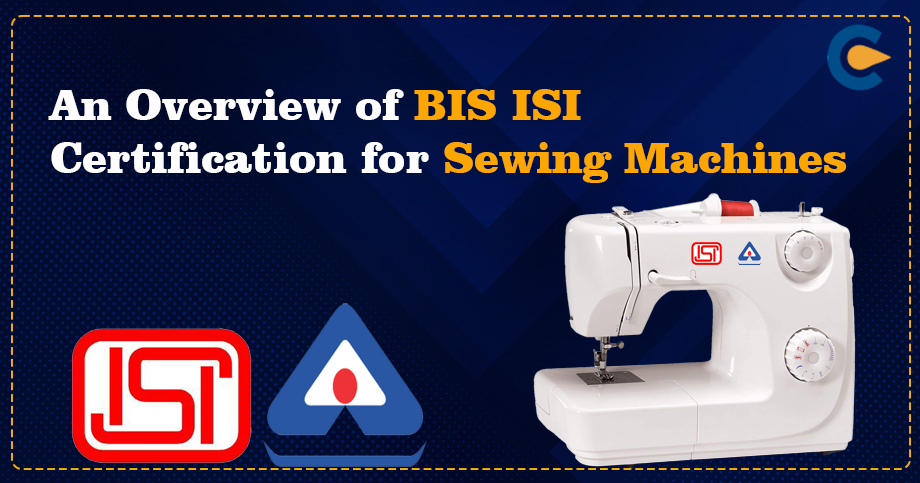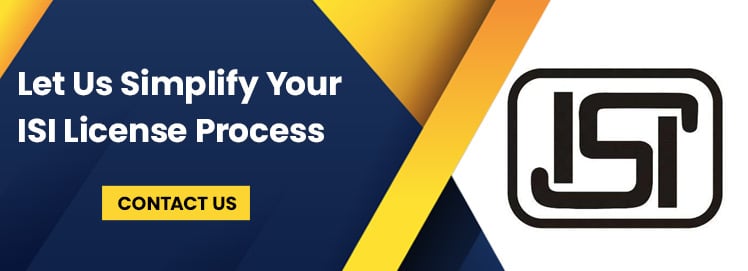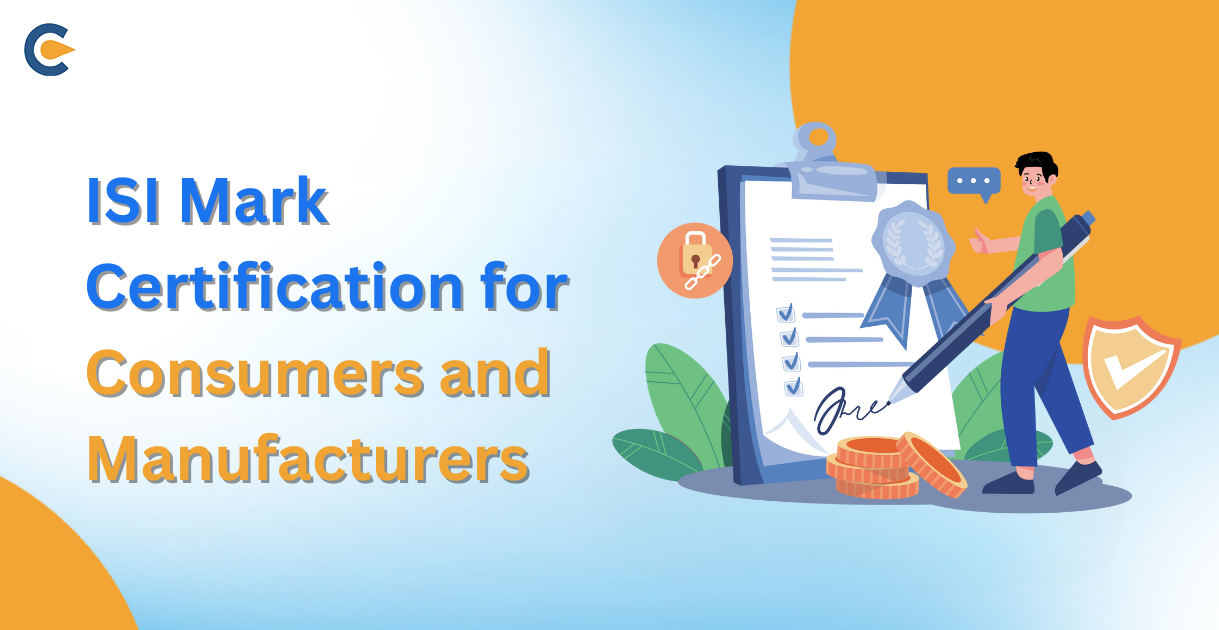The sewing machines were invented in 1790 by an English inventor (Thomas Saint). A sewing machine is a machine which is used for stitching material (like cloth or leather), usually having a needle & shuttle to carry thread and powered by treadle, waterpower, or electricity. The market size for sewing machines in India has been expanding in the last few years, with order books full & the government pumping in investments to the tune of 1 billion USD in the last five years. As per the report, in 2021, the market size of the Indian sewing machines business was 50.8 million USD, which was 47 million USD in 2020. In this blog, we are going to discuss BIS ISI Certification for Sewing Machines.
Brief of BIS Certification
BIS is the short form for the Bureau of Indian Standards, and a National Standard Body constituted under the BIS Ac 2016. BIS was introduced to harmonise marking, standardisation, and quality certification of products and incidental or connected issues. BIS is providing tangible & traceable advantages to the national economy by providing reliable & safe quality products, promoting import & export substitutes, decreasing health hazards to customers, controlling the proliferation of varieties, etc., by standardisation, certification and testing. Following are the main purpose of BIS:
- Continual and harmonious growth of standardisation, marking, and quality certification.
- Seamless development of a national strategy for Indian standards recognition & syncing them with the development of products and exports
- To ensure a new thrust to quality control and standardisation.
What is ISI Mark?
After India gained independence, various criteria were implemented in the Indian markets to guarantee the sale of high-quality goods. ISI, the original name of the BIS, stood for “Indian Standards Institute” and is recognised by a special licence number with seven digits (CM/L -XXXXXX). Manufacturers must obtain this BIS ISI certification from the Bureau of Indian Standards (BIS) to sell particular products in India. The presence of the BIS ISI certification Mark on commercial products ensures that the Product has been manufactured using high-quality controls and per Bureau of Indian Standards guidelines.
Basic Requirements for BIS ISI Certification for Sewing Machines
The following are the basic requirements for getting BIS ISI Certification, as listed below:
- The Product needs to meet the Indian Standard Specification criteria.
- Suppose a manufacturer has more than one factory, each located at a different geographical location. In that case, the business must file a separate application form for each Product & factory location.
- All testing facilities & production machinery should be located on the factory premises according to ISS (Indian Standard Specifications) norms & respective SIT (Scheme of Inspection and Testing)[1].
- The technical guidelines are mentioned for all products covered under the ISI Certification scheme as product manuals. Product manuals include sampling guidelines, a list of test equipment, a scheme of testing and inspection, a description of scope etc. Applicants can refer to this product manual for BIS ISI Certification to prepare for the audit & submit the application so that chances of rejection can be avoided.
- All the processes should be completed in the same factory, from receiving raw materials to the final packing of the products. In case of any outsourcing is required, clearance by the BIS may be requested.
- The BIS authorised Laboratory should be fully equipped with product testing devices and qualified quality control personnel to test the Product per the applicable ISS (Indian Standard Specifications).
- The BIS Certification is only provided to the factory (manufacturer of finished products), not to the Retailer or Distributor.
Advantages of Obtaining BIS ISI Certification for Sewing Machines
Following are the advantages of getting BIS ISI Certification for Sewing Machines in India:
- Provides ground for Total Quality Management, i.e., TQM
- Get rid of overhead expenses used to manufacture the final products.
- Ensures better utilisation of resources.
- Serves as strong evidence of product quality.
- Facilitate global recognition, thereby ensuring access to untapped and overseas markets.
- Aids firm to improve market reputation over time.
- Enable firm to deploy bespoke quality management.
Documents Required for Obtaining BIS ISI Certification for Sewing Machines
Following are some vital documents needed to obtain BIS ISI Certification for Sewing Machines in India:
- Name & Address proof of the applicant.
- Name & Address proof of the factory.
- SSI/MSME Certificate
- Proof of Establishment of Manufacturing premises like Certificate of Incorporation, Registration Certificate, MOA, etc.
- Layout plan;
- Information on Outsourcing of the manufacturing process;
- Flow chart of Manufacturing Process;
- Map Location plan of the factory;
- List of Testing equipment and facilities;
- Detailed List of Machinery involved;
- Third-party laboratory test report of Product according to the Indian Standards;
- If an authorised signatory signs the Application form, an authorisation letter by the CEO in the name of the authorised signatory
- Calibration Certificates of testing equipment;
- Technical details of products, like PCB Layout, Schematic Diagrams, User Manual & Critical Components List;
- In the case of a foreign manufacturer, the Indian Agent and Nomination Form information;
- Acknowledgement receipt;
- Undertaking and Affidavit attested with ID Proof & signature of the authorised Indian Representative (In case of foreign manufacturer);
- Letter of Consent by CEO of Company;
- Undertaking related to the test report;
- Original Product Test Reports from BIS authorised Laboratory;
Procedure to Obtaining BIS ISI Certification for Sewing Machines
Process for BIS ISI Certification for Sewing Machines includes registration and surveillance process:
- The steps for the Registration process are as follows:
Step 1: Applicant must fill out the application Form-v as the BIS prescribes.
Step 2: The applicant must submit all the essential documents along with the Application Form.
Step 3: The BIS Official and Inspection team visits the applicant factory after receiving the application form for a preliminary inspection.
Step 4: The BIS Official and Inspection team also examines the product samples.
Step 5: After completing an evaluation, the BIS Official prepares the Final test report of the Product.
- After the inspection procedure, the BIS Official and Inspection team conducts the Surveillance process for a complete factory survey. The Steps of the Surveillance process are as follows:
Step 1: Examining officers visit the factory premises to testify to the test reports.
Step 2: BIS Official sends the product samples to the BIS authorised Laboratory for testing.
Step 3: Test report of Product gives feedback or brief on the examination.
Step 4: A performance review report is prepared.
Step 5: After examining every report, BIS grants the BIS ISI Certification for Sewing Machines.
Conclusion
Last but not least, if a manufacturer or importer of a product falls under the purview of the BIS Conformity Assessment Scheme, they are required to obtain BIS ISI Certification (BIS marking). According to Regulation 11 of the 2018 BIS (Conformity Assessment) Regulations, the Bureau may cancel the licence if the requirements of the licence are broken.
Read our Article:An overview of ISI Mark for Kitchen Appliances













